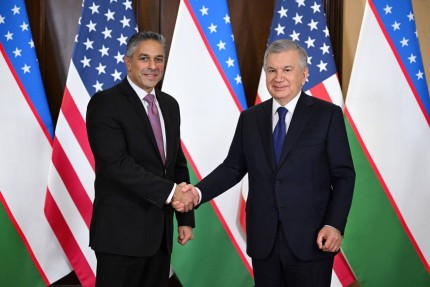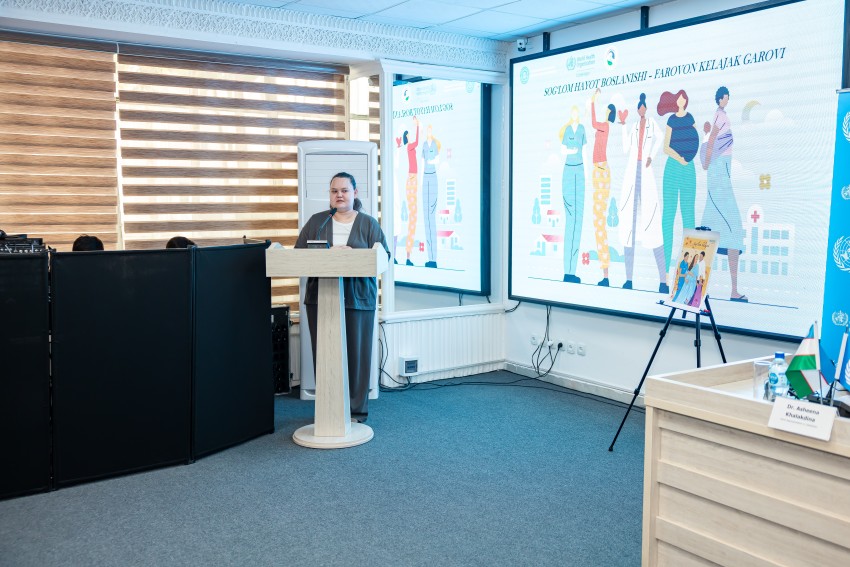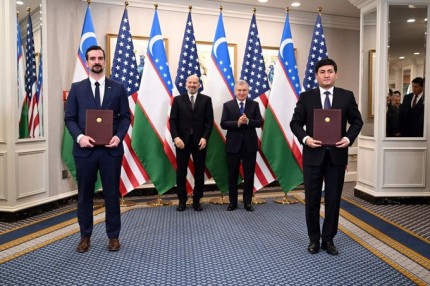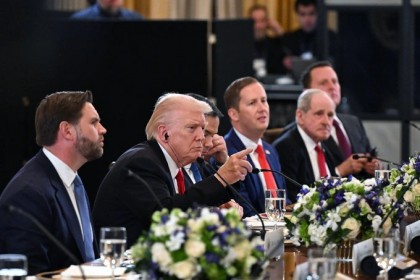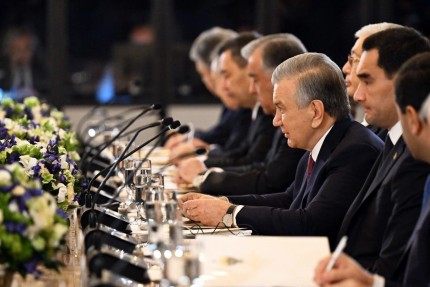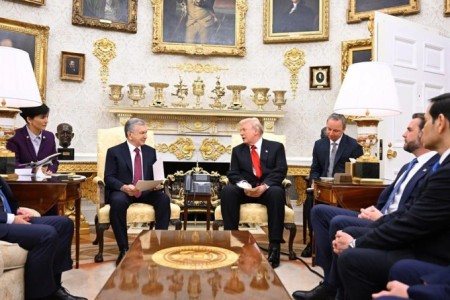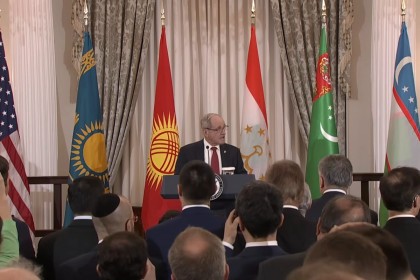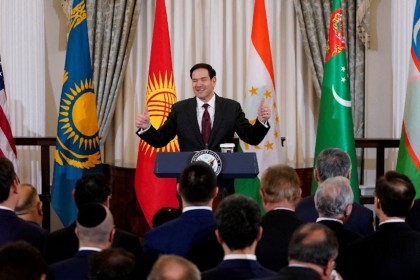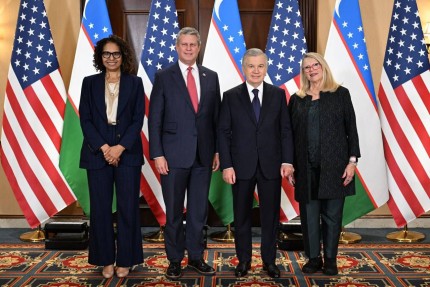Today, the president Shavkat Mirziyoyev made remarks at the sixth Central Asia Summit in Astana, Kazakhstan, the presidential press service said.
“Six years ago, it was here, in Astana, that we held the first Summit … We began to effectively interact and resolve pressing issues… Today, we can confidently talk about the beginning of the formation of a common regional identity,” the Uzbek leader said.
The president underscored that at this stage, “effective tools” were needed to implement the decisions taken and proposed improving the format of the consultative meeting to “deepen regional integration.”
He also touched on the international situation, emphasizing that Central Asia, due to its geopolitical position, “is fully experiencing all the negative consequences of the global crisis of confidence and the escalation of conflicts.”
“What is happening around Ukraine and in the Middle East directly affects the stable and sustainable development of the region. Traditional trade and transport chains have been disrupted. We have become hostages of the sanctions policy, logistics costs have increased significantly, inflationary pressure is growing. Opportunities in the global capital market are shrinking, protectionism is increasing, and new barriers are emerging,” Shavkat Mirziyoyev said.
Matters related to the development of the situation in Afghanistan, “an important factor in the stability of the region,” have moved to the “back burner” of the international agenda, he underscored.
“The present and future of the Central Asia, the well-being of our countries and peoples largely depend on our common efforts, on our readiness to closely cooperate, take decisive measures, and jointly advance the interests of the region,” the president said, adding that he considers it appropriate to develop a Concept for Ensuring Regional Security and Stability.
The leader of Uzbekistan outlined six priority areas for regional cooperation:
1. New model for the development of long-term economic partnership
“Our countries are natural trading partners, and our national economies complement each other. At the same time, analysis shows that today intraregional trade accounts for an insignificant share of the total trade turnover of our countries. There are still barriers to the formation of a full-fledged free trade zone in Central Asia,” said Shavkat Mirziyoyev.
He underscored that Uzbekistan, with the involvement of international experts, conducted an analysis and identified priority measures that will ensure a twofold increase in mutual trade volumes in the next five years.
“First of all, we are talking about the following measures: the elimination of tariff and non-tariff barriers, mutual recognition of certificates of conformity and unification of regulations, digitalization of customs operations and phytosanitary procedures, consideration of the possibility of mutual access to public procurement,” the president said.
According to him, the strategic goal of the region should be the formation of a Single Regional Market.
To consider these issues, the president proposed launching an Economic Council, within the framework of which regular meetings will take place at the level of deputy prime ministers of the Central Asian countries. Uzbekistan is ready to host the first such meeting in Tashkent next year, he added.
2. Mutual support and stimulation of industrial cooperation
"We already have successful examples of such partnership with each country in the region. These are special zones of cross-border cooperation, projects for the production of modern cars, consumer electronics, pharmaceuticals, agricultural and textile clusters, logistics centers and infrastructure projects," the president said.
"I believe that by joining forces, we will be able to form a Unified Map of Industrialization of the region with the creation of short value chains, attract investments and technologies from leading international companies, and introduce new forms of cooperation," Shavkat Mirziyoyev emphasized.
In this area, according to the head of Uzbekistan, it is important to launch a Council at the ministerial level and prepare a policy document.
"The establishment of the Central Asian Investment Council, the creation of the Bank for Innovative Development of the countries of the region, and the regular holding of joint investment forums are also promising. I would like to underscore that the investment attractiveness of all Central Asian states depends on coordinated work in this direction," the president said.
3. Intraregional transport and communications network
"According to the World Bank, our countries are still among the least "connected" economies in the world. Moreover, due to the peculiarities of the region's geography, the share of costs for transporting foreign trade cargo reaches 50% of the final cost of goods. This is four to five times higher than the global average," said Shavkat Mirziyoyev.
He noted that today there are “many projects” on the agenda that provide access to the markets of the European Union, China, South and Southeast Asia, and the Middle East.
“The issues of forming and implementing a coordinated tariff policy, applying benefits and preferences to support national carriers, modernizing the transport network and infrastructure, increasing the capacity of border checkpoints, and digitalizing the transport sector require a systematic approach,” the president added.
He thanked the heads of the Central Asian countries for supporting the adoption of the Agreement on Transport and Transit and proposed holding an expert conference with the participation of transport ministries, carriers and forwarders, logistics companies, and specialists.
4. Ensuring food security
“As national experts and specialists from the Food and Agriculture Organization of the United Nations confirm, we can not only meet intraregional needs for basic food products, but also take a strong position in the international market,” the president said.
He noted that it is important to introduce innovative agricultural production methods, water-saving technologies, increase crop yields, develop deep processing, strengthen scientific work in the field of selection, create clusters and "smart" farms.
5. Climate change
"The consequences of global climate change are felt in each of our countries. Rising temperatures, melting glaciers, floods, droughts, dust storms and many other challenges continue to cause serious damage," Shavkat Mirziyoyev emphasized.
He proposed that the countries of the region speak "with a single position" at the UN climate summit in Azerbaijan in November this year.
"We are talking about holding a joint presentation of the environmental situation in the region to attract the attention of the international community, funds and donor organizations to solving these pressing problems, including the Aral catastrophe," he explained.
Among the new proposals of Uzbekistan is the development and adoption of a comprehensive Program for Sustainable Development of Central Asia, as well as a Regional Strategy for the Rational Use of Water Resources of Transboundary Rivers.
6. Partnership in the energy sector.
"Today, a number of strategic projects are being developed on a regional scale to increase electricity generation and export it to third countries. In addition, there are plans to develop nuclear energy and increase hydrocarbon supplies. I believe that this is one of the key areas for coordinated work within the framework of regular meetings of energy ministers," said Shavkat Mirziyoyev.
He added that the tourism sector is becoming a new driver of regional partnership, and the share of intraregional tourist flow in the countries of the region in recent years "has increased significantly."
"In order to expand tourism exchange, we propose studying the issue of mutual recognition of national ID cards and the development of mass tourism products based on the principle of "One tour - the whole region,"" the president said.
At the end of his speech, the head of Uzbekistan also proposed preparing for signing a multilateral agreement on strategic partnership and cooperation in Central Asia.
"I am convinced that the fruitful results of today's meeting will serve to further strengthen friendship and good neighborliness in the region, expand practical cooperation for the benefit of our peoples," the President emphasized.
The seventh summit of the heads of state of Central Asia will take place in Uzbekistan in August 2025.


